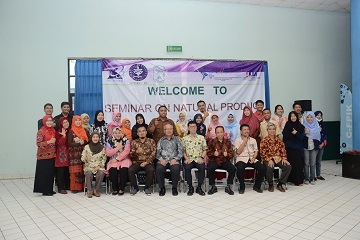Biofarmaka IPB Invites Indonesians to Develop Herbal Products

Tropical Biopharmacy Research Center (Trop BRC), Institute for Research and Community Service (LPPM), Bogor Agricultural University (IPB), in cooperation with The Indonesian Association of Natural Drugs Researchers (Perhipba), invite Indonesians to develop local herbal products. It was stated during the event Seminar on Natural Products as A Part of World Class Professor Program Scheme A which was held in Sumardi Sastrakusumah Auditorium, Faculty of Fisheries and Marine Sciences (FPIK IPB), IPB Dramaga Campus, Bogor (1/11).
Director of Trop BRC IPB, Dr. Irmanida Batubara, said that there are many potentials in Indonesian herbal products, but these products aren’t fully utilized, especially for medical purposes. Currently, Indonesians only use herbs as a material to make ‘jamu’ in a traditional process. Despite this fact, there are efforts from some companies to market herbal products as ‘jamu’ or potion globally.
“During this opportunity, we will share knowledge and experience in utilizing existing herbal products. Not only that, from this seminar we will get more insights about our natural resources,” said Dr. Irmanida.
Dr. Irmanida emphasized that since long herbal products are known to have clinical efficacy in curing various diseases. Some of those herbal products, including ginger, temu ireng, turmeric, cumin, etc. have been clinically proven to have a preventive effect on various diseases, even curing them. Although there are many new researches stating that herbal products can reduce the risk of degenerative diseases, herbal products have long been used as a material of drugs in several countries for generations. One of the countries is China. In that country, more than 90 percent of drugs materials use herbal substances.
Until now, herbal drugs are only small in amount. Herbal drugs or ‘jamu’ in market are still dominated by products that should be brewed before consumed. On the other hand, the role of doctors in prescribing herbal drugs to patients are still limited. The decision of not prescribing herbal drugs came from the doctors’ lack of knowledge in herbal medicine. Currently, a doctor’s competence is regulated by the law so that doctors cannot prescribe herbal medicine carelessly.
The potential in developing traditional drugs or herbal products in Indonesia is very big. According to a research that has been done, 87% of herbal drugs consumers admitted that herbal drugs are effective in curing diseases. On the other hand, international trade of traditional drugs keeps on increasing alongside the publication of research papers that state that herbal drugs are medically effective and safe to consume. This opportunity can be used to export several pioneer commodities which are Indonesia’s specialties, such as ginger. However, there are challenges that business owners or medical practitioners have to put attention to, which is the herbal substance quality standard that has to be fulfilled so that the chemical substances in those products match with the suggested dosage.
This herbal products seminar presented Prof. Eiichiro Fukusaki (Osaka University, Japan), Prof. Dr. I Nyoman Pugeng Aryantha (Bandung Institution of Technology), Prof. Dr. Dr. Muhamad T. Kamaludin, M.Sc, Sp.FK. (Sriwijaya University), Dr. Siti Sa’diah, M.Si., Apt. (Trop BRC IPB), Dr. Kholis A Audah, and Dr. Waras Nurcholis, S.Si, M.Si (Trop BRC IPB). (Ard)



